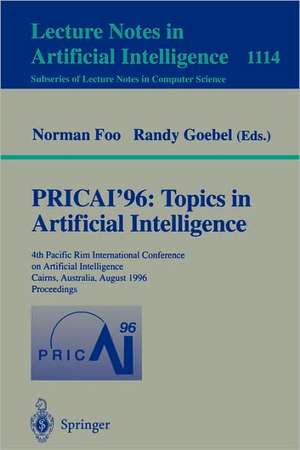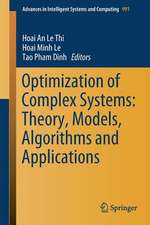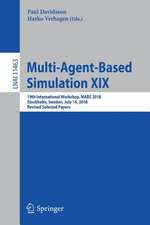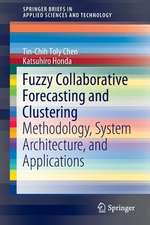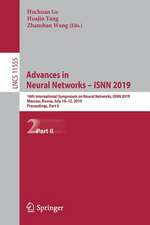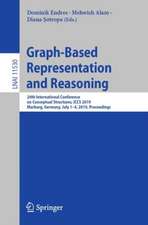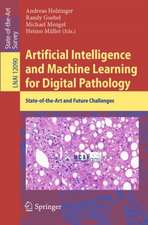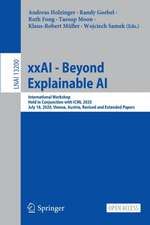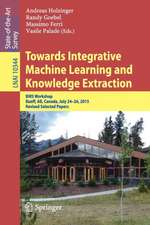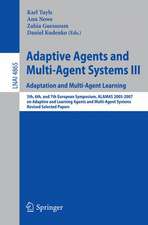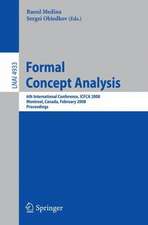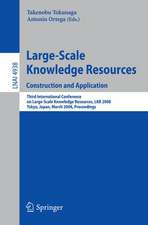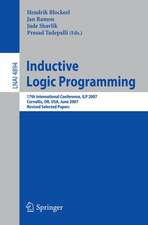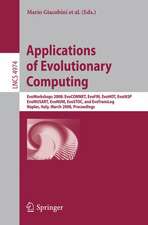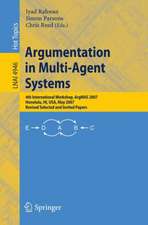PRICAI '96: Topics in Artificial Intelligence: 4th Pacific Rim International Conference on Artificial Intelligence, Cairns, Australia, August 26 - 30, 1996, Proceedings: Lecture Notes in Computer Science, cartea 1114
Editat de Norman Foo, Randy Goebelen Limba Engleză Paperback – 30 iul 1996
The 56 revised full papers included in the book were carefully selected for presentation at the conference from a total of 175 submissions. The topics covered are machine learning, interactive systems, knowledge representation, reasoning about change, neural nets and uncertainty, natural language, constraint satisfaction and optimization, qualitative reasoning, automated deduction, nonmonotonic reasoning, intelligent agents, planning, and pattern recognition.
Din seria Lecture Notes in Computer Science
- 20%
 Preț: 1061.55 lei
Preț: 1061.55 lei - 20%
 Preț: 307.71 lei
Preț: 307.71 lei - 20%
 Preț: 438.69 lei
Preț: 438.69 lei - 20%
 Preț: 645.28 lei
Preț: 645.28 lei -
 Preț: 410.88 lei
Preț: 410.88 lei - 15%
 Preț: 580.46 lei
Preț: 580.46 lei - 17%
 Preț: 427.22 lei
Preț: 427.22 lei - 20%
 Preț: 596.46 lei
Preț: 596.46 lei -
 Preț: 381.21 lei
Preț: 381.21 lei - 20%
 Preț: 353.50 lei
Preț: 353.50 lei - 20%
 Preț: 1414.79 lei
Preț: 1414.79 lei - 20%
 Preț: 309.90 lei
Preț: 309.90 lei - 20%
 Preț: 583.40 lei
Preț: 583.40 lei - 20%
 Preț: 1075.26 lei
Preț: 1075.26 lei - 20%
 Preț: 310.26 lei
Preț: 310.26 lei - 20%
 Preț: 655.02 lei
Preț: 655.02 lei - 20%
 Preț: 580.93 lei
Preț: 580.93 lei - 20%
 Preț: 340.32 lei
Preț: 340.32 lei - 15%
 Preț: 438.59 lei
Preț: 438.59 lei - 20%
 Preț: 591.51 lei
Preț: 591.51 lei - 20%
 Preț: 649.49 lei
Preț: 649.49 lei - 20%
 Preț: 337.00 lei
Preț: 337.00 lei -
 Preț: 449.57 lei
Preț: 449.57 lei - 20%
 Preț: 607.39 lei
Preț: 607.39 lei - 20%
 Preț: 1024.44 lei
Preț: 1024.44 lei - 20%
 Preț: 579.30 lei
Preț: 579.30 lei - 20%
 Preț: 763.23 lei
Preț: 763.23 lei - 20%
 Preț: 453.32 lei
Preț: 453.32 lei - 20%
 Preț: 575.48 lei
Preț: 575.48 lei - 20%
 Preț: 585.88 lei
Preț: 585.88 lei - 20%
 Preț: 825.93 lei
Preț: 825.93 lei - 20%
 Preț: 763.23 lei
Preț: 763.23 lei - 17%
 Preț: 360.19 lei
Preț: 360.19 lei - 20%
 Preț: 1183.14 lei
Preț: 1183.14 lei - 20%
 Preț: 340.32 lei
Preț: 340.32 lei - 20%
 Preț: 504.57 lei
Preț: 504.57 lei - 20%
 Preț: 369.12 lei
Preț: 369.12 lei - 20%
 Preț: 583.40 lei
Preț: 583.40 lei - 20%
 Preț: 343.62 lei
Preț: 343.62 lei - 20%
 Preț: 350.21 lei
Preț: 350.21 lei - 20%
 Preț: 764.89 lei
Preț: 764.89 lei - 20%
 Preț: 583.40 lei
Preț: 583.40 lei -
 Preț: 389.48 lei
Preț: 389.48 lei - 20%
 Preț: 341.95 lei
Preț: 341.95 lei - 20%
 Preț: 238.01 lei
Preț: 238.01 lei - 20%
 Preț: 538.29 lei
Preț: 538.29 lei
Preț: 664.95 lei
Preț vechi: 831.19 lei
-20% Nou
Puncte Express: 997
Preț estimativ în valută:
127.25€ • 132.05$ • 106.36£
127.25€ • 132.05$ • 106.36£
Carte tipărită la comandă
Livrare economică 17-31 martie
Preluare comenzi: 021 569.72.76
Specificații
ISBN-13: 9783540615323
ISBN-10: 3540615326
Pagini: 692
Ilustrații: XXI, 658 p.
Dimensiuni: 155 x 235 x 36 mm
Greutate: 0.95 kg
Ediția:1996
Editura: Springer Berlin, Heidelberg
Colecția Springer
Seriile Lecture Notes in Computer Science, Lecture Notes in Artificial Intelligence
Locul publicării:Berlin, Heidelberg, Germany
ISBN-10: 3540615326
Pagini: 692
Ilustrații: XXI, 658 p.
Dimensiuni: 155 x 235 x 36 mm
Greutate: 0.95 kg
Ediția:1996
Editura: Springer Berlin, Heidelberg
Colecția Springer
Seriile Lecture Notes in Computer Science, Lecture Notes in Artificial Intelligence
Locul publicării:Berlin, Heidelberg, Germany
Public țintă
ResearchCuprins
A general framework for mechanizing induction using test set.- Inductive equational reasoning.- Cost-sensitive specialization.- Efficient multiple predicate learner based on fast failure mechanism.- Acquiring user preferences for information filtering in interactive multi-media services.- The development of an interactive fault diagnosis expert system for telecommunication applications.- An intelligent education system which supports scientific thinking: Galileo — Philosophy and basic architecture.- A unified approach to handling uncertainty during cooperative consultations.- Declarative program theory with implicit implication.- Knowledge decomposition: An analysis.- The concept classification of a terminology extended by conjunction and disjunction.- Extending partial orders for sort reasoning.- An update procedure for a probabilistic deductive database.- A framework for reasoning about requirements evolution.- An application of hierarchical knowledge integration in hand-written form processing.- AMI: A model of intelligence.- Symbol processing by non-symbol processor.- Fall diagnosis using dynamic belief networks.- Remembrance of discourse based on textual continuity: A spreading activation network.- Lexical access using minimum message length encoding.- Using neural nets to investigate lexical analysis.- Validity of normality assumption in CSP research.- An improved generic arc consistency algorithm and its specializations.- High-level synthesis optimisation with genetic algorithms.- A qualitative reasoning based on an ontology of fluid systems and its evaluation.- Parallel cost-based abductive reasoning for distributed memory systems.- A history-oriented envisioning method.- Team learning of recursive languages.- Combining views on concepts in unsupervisedconcept learning.- The complexity of batch approaches to reduced error rule set induction.- Learning simple recursive concepts by discovering missing examples.- On semantic resolution with lemmaizing and contraction.- Tableaux for expansion and contraction.- Translating machine-generated resolution proofs into ND-proofs at the assertion level.- Evidential temporal representations and reasoning.- Using artificial neural networks for meteor-burst communications trail prediction.- Modeling commonsense rules in an inference network.- Adaptive SEJONG-NET for on-line Hangul recognition.- A unified algebraic structure for uncertain reasonings.- Exten: A system for computing default logic extensions.- A logic for concurrent events and action failure.- Domain world models represented from variable viewpoints for ICAI systems of high-school chemistry.- Creating theoretical terms for non-deterministic actions.- Conservative expansion concepts for default theories.- On formation of exception hierarchy.- Anytime default inference.- Studying properties of classes of default logics — Preliminary report.- Learning cooperative behavior in multi-agent environment a case study of choice of play-plans in soccer.- CiFi: An intelligent agent for citation finding on the World-Wide Web.- Automatic making of Sokoban problems.- Bringing about rationality: Incorporating plans into a BDI agent architecture.- An architecture for autonomous flying vehicles: A preliminary report.- Face recognition through hough transform for irises extraction and projection procedures for parts localization for facial caricaturing system PICASSO.- Extraction of face region and features based on chromatic properties of human faces.- A fast pattern-matching algorithm using matching candidates for production systems.
